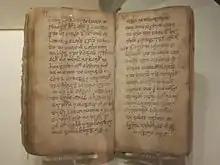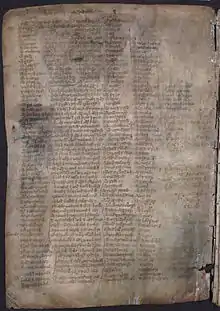MacMhuirich bardic family
The MacMhuirich bardic family, known in Scottish Gaelic as Clann MacMhuirich[2] and Clann Mhuirich,[3] and anglicised as Clan Currie[4] was a prominent family of bards and other professionals in 15th to 18th centuries. The family was centred in the Hebrides, and claimed descent from a 13th-century Irish bard who, according to legend, was exiled to Scotland. The family was at first chiefly employed by the Lords of the Isles as poets, lawyers, and physicians.[2] With the fall of the Lordship of the Isles in the 15th century, the family was chiefly employed by the chiefs of the MacDonalds of Clanranald. Members of the family were also recorded as musicians in the early 16th century, and as clergymen possibly as early as the early 15th century.
History
Supposed origins
The family claimed descent from Muireadhach Albanach Ó Dálaigh (fl.1200–1230).[2] Muireadhach Albanach was a member of the eminent Ó Dálaigh bardic dynasty. This family is sometimes traced back to either of two men named Dálach: one is the legendary student of Abbot Colmán mac Lénéni of Cloyne; the other is another legendary figure, who was a descendant of the 8th-century Irish king Fergal mac Maíle Dúin, son of Maíle Fithraig. Muireadhach Albanach gained the nickname Albanach ("the Scot")[5] in reference to the time he spent in Scotland.[6] He supposedly spent 15 years in there, after being exiled for killing a steward of Domhnall Mór Ó Domhnaill (1207–1241), Lord of Tyrconell. While in Scotland, Muireadhach Albanach was employed as a bard by the Earls of Lennox, and it appears as if members of his family also settled in the Lennox, as a "Kathil Macmurchy" is recorded in the Lennox in the mid 13th century.[note 1] In a lament that Muireadhach Albanach composed on the death of his wife, Maol Mheadha, he stated that they had 11 children.[8]
A professional family

An early member of the MacMhuirich family was Lachlann Mór MacMhuirich, who authored the battle-incitement poem of Clan Donald (Clann Domhnaill) sometime before the Battle of Harlaw, which took place in 1411. A possible descendant of Lachlann's was one "Lacclannus mcmuredhaich archipoeta", who witnessed a charter of Aonghas of Islay, son of the last member of Clann Domhnaill to be recognised as Lord of the Isles. Other members of the MacMhuirich family, possibly one or two, composed poems of Aonghas's murder that are preserved in the Book of the Dean of Lismore.[2] From about the 1490s and onwards, members of the family are also recorded as clergymen (and possibly as early as 1432, if the "John Muaritti" recorded in the Apostolic Camera is indeed a MacMhuirich).[9]
Following the collapse of the Lordship of the Isles, the MacMhuirich family appears to have been chiefly employed by the chiefs of the MacDonalds of Clanranald (Clann Raghnaill). The earliest poet of the MacMhuirich family on record is Niall Mór MacMhuirich (c. 1550 - c. 1613). A member of the family was the seanchaidh (story-teller and genealogist) who authored much of the Books of Clanranald, which date to the 17th and early 18th centuries.[2] One of these books, the so-called Red Book, is best known for its account of the history of Clann Domhnaill, which was composed by Niall. The other book, the so-called Black Book, is more of a miscellaneous compilation, although it contains a version of Niall's history composed by a member of the Beaton kindred, another learned family of professionals that was once centred in the Hebrides.[10]
Other noted members of the family were Cathal MacMhuirich (fl.1625) and Niall MacMhuirich (c.1637–1726),[2] the last fully competent practitioner of the family and who was still working in the first quarter of the 18th century.[11] In the first part of the 16th century members of the family are also recorded as Harpers, and one "John oig Mc murcquhie leiche in Ilay", a physician, is recorded in 1615.[12] In the second half of the 17th century, Ruairidh MacMhuirich (anglicised as Roderick Morison), known as an Clàrsair Dall (the Blind Harper) was a bard who served Chief John MacLeod "the Speckled" of Clan MacLeod until the latter's death in 1693. John's successor, the similarly named Rockerick MacLeod "the Younger", was an absentee landlord for whom Morison composed Oran do Mhac Leoid Dhun Bheagain ("A Song for MacLeod of Dunvegan"), rebuking the chief for not performing his traditional duties to his subjects and failing to support traditional Gaelic culture. Morison died in 1713.[13][14] The last of the family to practice Classical Gaelic poetry was Domhnall MacMhuirich, who lived on South Uist, as a tenant of Macdonald of Clanranald, in the 18th century.[2]
Modern day
In 1959, descendants of Clann MacMhuirich (known today as Clan Currie) elected World War II veteran Colonel William McMurdo Currie as their chief. Before his death in 1992, he named Robert Currie, who established the non-profit organisation The Clan Currie Society, as his successor as "Clan Commander". The Society continues to promote traditional Gaelic music and poetry.[15]
Notes
References
- 1467 manuscript, (www.1467manuscript.co.uk), retrieved 24 December 2010
- Clancy, Thomas Owen (2006), "Clann MacMhuirich", in Koch, John T. (ed.), Celtic Culture: A Historical Encyclopedia, Santa Barbara: ABC-CLIO, p. 453, ISBN 1-85109-445-8
- Clancy, Thomas Owen (2006), "Scottish Gaelic Poetry (1)", in Koch, John T. (ed.), Celtic Culture: A Historical Encyclopedia, Santa Barbara: ABC-CLIO, p. [1577–1578, ISBN 1-85109-445-8
- "The MacMhuirich Bardic Family - The Learned Kindred of Currie". Clan Currie. The Clan Currie Society, Inc. Retrieved 29 July 2022.
- Maier, Bernhard (2003), The Celts: a history from earliest times to the present, University of Notre Dame Press, p. 151, ISBN 978-0-268-02360-7
- Ó Broin, Brian (2006), "Ó Dálaigh family", in Koch, John T. (ed.), Celtic Culture: A Historical Encyclopedia, Santa Barbara: ABC-CLIO, pp. 1374–1375, ISBN 1-85109-445-8
- University of Aberdeen. Celtic Department (1988), Scottish Gaelic studies, Volumes 15–17, Oxford University Press, p. 123
- Clancy, Thomas Owen (2006), "Muireadhach Albanach Ó Dálaigh", in Koch, John T. (ed.), Celtic Culture: A Historical Encyclopedia, Santa Barbara: ABC-CLIO, pp. 1375–1376, ISBN 1-85109-445-8
- Thomson, Derick S. (1968), "Gaelic Learned Orders and Literati in Medieval Scotland", Scottish Studies, The Journal of the School of Scottish Studies University of Edinburgh, 12 (1): 67, 76 n2
- Gillies, William (2006), "Books of Clanranald", in Koch, John T. (ed.), Celtic Culture: A Historical Encyclopedia, Santa Barbara: ABC-CLIO, pp. 453–454, ISBN 1-85109-445-8
- Lynch, Michael (2011). Oxford Companion to Scottish History. Oxford University Press. p. 255. ISBN 978-0-19-923482-0.
- Thomson, Derick S. (1968), "Gaelic Learned Orders and Literati in Medieval Scotland", Scottish Studies, The Journal of the School of Scottish Studies University of Edinburgh, 12 (1): 65
- Chisholm, Colin (1886). "Old Gaelic Songs". Transactions of the Gaelic Society of Inverness. 12: 137. Retrieved 6 July 2022.
- Koch, John T. (2015). Celtic Culture: A Historical Encyclopedia. Santa Barbara, California: ABC-CLIO. p. 1227. ISBN 978-1851094400. Retrieved 6 July 2022.
- "Clan Currie History". Electric Scotland. Retrieved 29 July 2022.
See also
- Beaton medical kindred - another major learned Gaelic kindred.
Further reading
- Black, Ronald (1976–1978), "The Genius of Cathal MacMhuirich", Transactions of the Gaelic Society of Inverness, Gaelic Society of Inverness, 50: 327–366
- Bruford, Alan (1965), "A Lost MacMhuirich Manuscript", Scottish Gaelic Studies, 10 (2): 158–161
- Thomson, Derick S. (1960–1963), "The MacMhuirich bardic family", Transactions of the Gaelic Society of Inverness, Gaelic Society of Inverness, 43: 276–304
- Thomson, Derick S. (1969–1970), "The Poetry of Niall MacMhuirich", Transactions of the Gaelic Society of Inverness, Gaelic Society of Inverness, 46: 281–307
- Thomson, Derick S. (1974–1976), "Niall Mòr MacMhuirich", Transactions of the Gaelic Society of Inverness, Gaelic Society of Inverness, 39: 9–25
- Thomson, Derick S. (1977), "Three Seventeenth-Century Bardic Poets: Niall Mór, Cathal and Niall MacMhuirich", in Aitken, A. J.; McDiarmid, M. P.; Thomson, Derick S. (eds.), Bards and Makars. Scottish Language and Literature: Medieval and Renaissance, University of Glasgow Press, pp. 221–246
